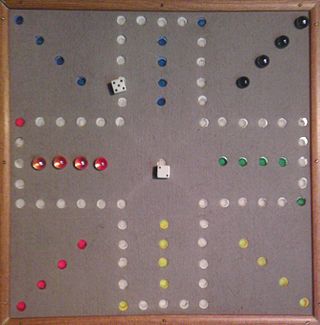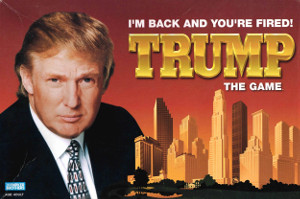
Monopoly is a multi-player economics-themed board game. In the game, players roll two dice to move around the game board, buying and trading properties and developing them with houses and hotels. Players collect rent from their opponents and aim to drive them into bankruptcy. Money can also be gained or lost through Chance and Community Chest cards and tax squares. Players receive a salary every time they pass "Go" and can end up in jail, from which they cannot move until they have met one of three conditions. House rules, hundreds of different editions, many spin-offs, and related media exist. Monopoly has become a part of international popular culture, having been licensed locally in more than 103 countries and printed in more than 37 languages. As of 2015, it was estimated that the game had sold 275 million copies worldwide. The original game was based on locations in Atlantic City, New Jersey, United States.
Anti-Monopoly is a board game made by San Francisco State University Professor Ralph Anspach in response to Monopoly. The idea of an anti-monopoly board game dates to 1903 when Lizzie Magie created The Landlord's Game, which later inspired Monopoly.

Charles Brace Darrow was an American board game designer who is credited as the inventor of the board game Monopoly. Although the original idea for the game came from Lizzie Magie's The Landlord's Game, Darrow has been credited as the creator by Parker Brothers, the game's publisher.

Elizabeth J. Magie Phillips was an American game designer, writer, feminist, and Georgist. She invented The Landlord's Game, the precursor to Monopoly, to illustrate teachings of the progressive era economist Henry George.

Milburn Pennybags, more commonly known as "Rich Uncle" Pennybags, is the mascot of the board game of Monopoly. He is depicted as a portly old man with a moustache who wears a morning suit with a bowtie and top hat. In large parts of the world he is known, additionally or exclusively, as the Monopoly Man, or Mr. Monopoly. He also appears in the related games Advance to Boardwalk, Free Parking, Don't Go to Jail, Monopoly City, Monopoly Junior, and Monopoly Deal.

SolarQuest is a space-age real estate trading board game published in 1985 and developed by Valen Brost, who conceived the idea in 1976. The game is patterned after Monopoly, but it replaces pewter tokens with rocket ships and hotels with metallic fuel stations. Players travel around the Sun acquiring monopolies of planets, moons, and man-made space structures. They seek to knock their opponents out of the game through bankruptcy, as well as optional laser blasts and dwindling fuel supplies.
Monopoly Junior is a simplified version of the board game Monopoly, designed for young children, which was originally released in 1990. It has a rectangular board that is smaller than the standard game and rather than using street names it is based on a city's amusements to make the game more child-friendly. There are many different models of the game.
Hong Kong Monopoly is an edition of the popular board game Monopoly. It features properties, railroads and utilities located in Hong Kong, in place of those from the original game.

The Landlord's Game is a board game patented in 1904 by Elizabeth Magie as U.S. Patent 748,626. It is a realty and taxation game intended to educate users about Georgism. It is the inspiration for the 1935 board game Monopoly.
Don't Go to Jail is a 1991 Parker Brothers dice game for two or more players inspired by Monopoly. The game is played by rolling ten dice and attempting to roll matches to score points.
Dungeons & Dragons: The Fantasy Adventure Board Game, released in 2002 by Parker Brothers, a division of Hasbro, is based on the role-playing game Dungeons & Dragons (D&D) by Wizards of the Coast. The game is distributed in the European market only.

Marven Gardens is a neighborhood in Margate City, Atlantic County, New Jersey, United States, located two miles (3 km) south of Atlantic City.

The board game Monopoly has its origin in the early 20th century. The earliest known version, known as The Landlord's Game, was designed by Elizabeth Magie and first patented in 1904, but existed as early as 1902. Magie, a follower of Henry George, originally intended The Landlord's Game to illustrate the economic consequences of Ricardo's Law of economic rent and the Georgist concepts of economic privilege and land value taxation. A series of board games was developed from 1906 through the 1930s that involved the buying and selling of land and the development of that land. By 1933, a board game had been created much like the modern version of Monopoly sold by Parker Brothers and its related companies through the rest of the 20th century, and into the 21st. Several people, mostly in the midwestern United States and near the East Coast of the United States, contributed to design and evolution.

Easy Money or The Game of Easy Money was a board game introduced by Milton Bradley Company in 1935. Like Monopoly, the game is based on The Landlord's Game in the movement of pieces around the board, the use of cards, properties that can be purchased, and houses that can be established on them.

Aggravation is a board game for up to four players and later versions for up to six players, whose object is to be the first player to have all four playing pieces reach the player's home section of the board. The game's name comes from the action of capturing an opponent's piece by landing on its space, which is known as "aggravating". The name was coined by one of the creators, Lois Elaine, who did not always enjoy defeat.

Monopoly: The Mega Edition is a special variant of the popular board game Monopoly. The game was first published on May 22, 2006 by Winning Moves Games USA in the USA. A UK version was adapted on October 1, 2007.
Peter Pan Playthings Ltd was a British toy company founded in 1963. It bought Salter Science and other assets from the receivers of Thomas Salter Ltd. In 1972 the company reported a £80,000 profit. The following year it was acquired by Berwick Timpo.

An Amerigame, short for American-style board game, is a loose category of tabletop game that generally features a prominent theme, encourages direct conflict between players, and has a significant degree of luck. It is distinguished from a Eurogame, or German-style board game, in that American-style games often have longer playtimes and mechanics designed to suit the theme. Not all games from the United States fall under this category. Many of the famous games were invented outside USA. Party games like Codenames, cooperative board games like Pandemic, and family-friendly board games with simpler or abstract rules like Scrabble and Chess are usually excluded. Games of this genre are often nicknamed Ameritrash.

Trump: The Game is a board game named after Donald Trump. Milton Bradley Company initially released the game in 1989, but it sold poorly, with only 800,000 copies sold out of an expected two million. Parker Brothers re-released Trump: The Game in 2004 following the success of Trump's reality television series, The Apprentice, from earlier that year. Trump: The Game received poor reviews from critics and the public audience.
Ms. Monopoly is a version of Monopoly that recognizes women inventors and gives bonuses to feminine players. It was released by Hasbro in 2019.













